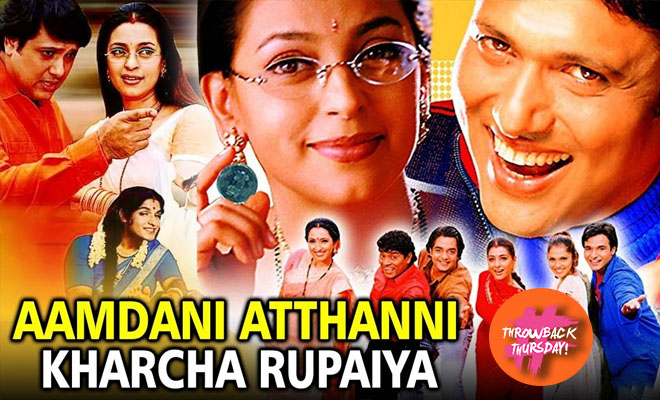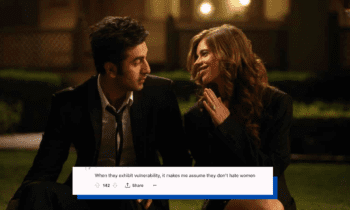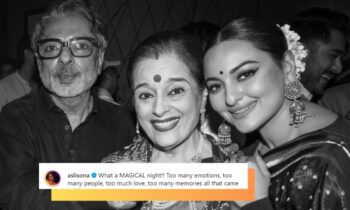Throwback Thursday: Aamdani Atthani Kharcha Rupaiya Was A Movie About Beating Up And Humiliating Your Wife. And It Was Supposed To Be Funny

I have grown up watching the kind of sexism that plays out in almost every Indian household. A mother is sweating in the kitchen while spending hours catering to the culinary needs of every individual. A daughter is confused about why her brother is not expected to learn how to cook. A wife is complaining that her husband doesn’t help in domestic chores, while he acts like it’s beneath him to do so. The very people who can’t even follow traffic rules so strictly adhere to traditional gender roles that were laid down by our ancestors who didn’t know any better.
As a generation that’s seen patriarchy so closely and that’s also exposed to modern societies across the globe, women of today can call a spade a spade. It’s that casual sexism that sometimes, even the best of us fails to see because that comes camouflaged and has several patrons. However, Aamdani Atthanni Kharcha Rupaiya is a movie that came so close to the point and then missed it. Throughout the movie, I couldn’t understand whether it’s trying to show a dark reality or mock it. And as I went deeper into the trashery in this film I realised that it’s the latter. This film is like that guy from a matrimonial app who writes “open-minded, modern” in his bio but gets shocked when you tell him you party and had ex-boyfriends.
The film revolves around three anti-couple goals: Meena (Tabu) and Ravi (Chandrachur Singh), Vimla (Ketki Dave), and Appu Khote (Johnny Lever), Anjali (Isha Koppikar) and Vijay (Vinay Anand). Right in the start, you understand that these men walk around with their self-blown ego bubble, which is constantly burst by their own irresponsibility. They are the kind of men who have no respect and gratitude for anyone – not their wives, their landlord, or their boss – making them highly dislikeable characters. And yet, the kind of respect they demand from their wives, you wonder if they are suffering the last stage of penis pride.
These men are from low-income groups and financial struggles are making their lives worse. But before you deem a lack of money as the source of their troubles, let me tell you it’s not. It’s an ugly amalgamation of their dickhead personality and grade A level of misogyny running in their veins that’s the reason behind their monetary issues. The moment they get their salary, they blow it up in alcohol, cigarettes, and women. Then they return home to their wives with half the monthly salary, and expect them to take care of the household and clear past dues. Ravi uses sex and flattery to dodge Meena’s financial complaints while Appu Khote uses violence.
Domestic Violence
Throughout the film, the men have used domestic violence against their wives and the scenes between Appu Khote and Vimla are shown as funny. He has dragged her, beaten her with a bamboo stick, and attempted to crash planters on her head. Appu Khote has threatened to chop her legs off and throw her on the road, cut her hands off and make her beg, cut her head off, and hang it on the door. Just after that, he orders her to cook him eggs and she obliges as if nothing has happened. What’s worse is that these scenes are shown as funny. When did domestic violence become something that’s meant to drum up laughter? Ravi too has slapped Meena in an argument and next day apologises like it meant nothing.
Meanwhile, they have Bhishma and Jhumri joining them in the neighbourhood and Bhishma is shown as the exact opposite of these shady men. The couple becomes a pillar of strength for the ladies.
Traditional gender roles
With their rising financial troubles, Jhumri advises women to start working and contributing to the family income. On hearing that, the husbands get so angry as if it’s a crime. First, the wives go to seek their husband’s permission – thus putting them on a pedestal themselves. Secondly, their monologue that why they wouldn’t have thought of taking up a job if the husbands were earning is shit. It completely misses the point. It’s not like women must be “allowed” to work in times of need.
While that’s the main trigger, you see these men feeling humiliated when expected to participate in domestic chores – be it cooking, taking care of children, or even turning off the flame when food is ready. At some point, Appu Khote, the most toxic one tries to reclaim his so-called leadership by getting his wife and children lots of gifts. And when she asks about the money, he tells her a wife must not be concerned about it and must simply accept what’s given, like a dog who pounces on a biscuit. And then you see Vimla barking like a dog. Is it funny? Is it not an insult to all of the womanhood?
Internalised misogyny
The film looks like it’s made from a man’s perspective because the obvious kind of sexism was shown and given lessons on. But what they totally missed is the internalized misogyny that was like the Frankenstein they created themselves. The women on seeing that Bhishma does all the work assumes that Jhumri must have a lot of “nakhre” initially.
These women accept abuse, disrespect, and place their husbands on a pedestal. Appu Khote beats his wife, blows smoke on her face, makes her sit on the floor and make his drink – and yet, she speaks of him like he’s an angel. Meena too ignores the humiliation and accepts slaps like it is all okay. In fact, they consider all of this as a sign of being good wives. You don’t say all of this proudly. If you’re feeding your man’s ego and accepting violence, you’re not supposed to feel proud of it. They also partake in the misogyny by telling their husbands that they can’t pull off cooking because it’s a woman’s job. In fact, ideally they should have left the house themselves but they waited to be thrown out.
At some point, they get really furious. Why? Because they were humiliated in public. So as long as their husbands humiliate them in private, it’s okay.
ALSO READ: Throwback Thursday: Om Jai Jagadish Promotes A Sexist Definition Of An Ideal Wife And Bahu In India
A delusional moral of the story
In the end, it takes a medical emergency and being beaten up by the police for them to realise that there’s nothing wrong with women working. Really, the film misses the point here. It’s not about money. It’s about misogyny. The movie ends with all the couples being happy and having better finances. But that just means everything else is okay and that it’s okay for women to work if needed.

















